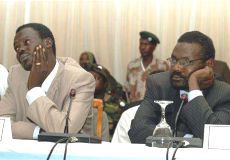Darfur talks hindered by rebel divisions
Jan 8, 2007 (KHARTOUM) — A new African Union and U.N. push to restart peace negotiations between Darfur rebels and Sudan’s central government will first have to overcome a major obstacle: Who is Khartoum to talk with?
 At the height of conflict in 2003, there were just two Darfur rebel groups. During African Union-backed talks in May there were three rebel factions.
At the height of conflict in 2003, there were just two Darfur rebel groups. During African Union-backed talks in May there were three rebel factions.
Since then the rebels have splintered into around a dozen official factions, in addition to the numerous individual commanders and political leaders who have resigned from various movements to follow their own agendas.
This leaves a troubling question for those trying to restart negotiations to stop the fighting which experts say have killed 200,000 people and driven 2.5 million from their homes. How many groups will sit at the negotiating table?
“Divisions complicate our mediation,” said African Union spokesman Noureddine Mezni. “If you are talking to seven or eight factions it is not easy.”
AU and U.N. mediation of new talks is to begin this year and U.N. special envoy Jan Eliasson was to arrive in Khartoum later on Monday to kickstart the process.
Presidential advisor Mustafa Osman Ismail said a united rebel front was ideal, but the government should if necessary allow all factions a seat at the table.
“If you are going to leave anyone outside it means you are going to help him to create a new faction and anyone who is not happy about the agreement will immediately defect and join the one outside the agreement,” he told Reuters.
BICKERING, RIVALRIES
Rebel bickering and rivalries have plagued numerous rounds of previous talks in Chad and Nigeria. This culminated in the May 2006 peace deal, signed by only the Sudan Liberation Army (SLA) splinter led by Minni Arcua Minnawi.
Many factions who rejected the deal formed a military alliance called the National Redemption Front (NRF), which renewed hostilities with Khartoum in June. The May ceasefire all but collapsed as the government remobilised militia to block the NRF offensive.
But internal bickering even afflicts the NRF. Its alliance is purely military and political leaders regularly publicly disclaim each other.
“We need to focus on the most important issues of finding a permanent ceasefire and uniting the rebel position,” said Yasir Arman, a senior member of the former southern rebels turned partners in central government, the Sudan People’s Liberation Movement (SPLM).
That will not be an easy task. Not only do personal rivalries divide the rebels, many have different demands. Some groups want to lift Islamic sharia law in Sudan and have a secular state. Others want a referendum on Darfur secession.
Minnawi who signed the May deal has lost much territory on the ground in Darfur since coming to Khartoum to take up his position as the fourth ranking member of the presidency.
In Khartoum he is almost ignored by policymakers and some of his core political allies and commanders have deserted him. Other rebel factions reject him, saying he surrounds himself with members of his minority Zaghawa tribe, sidelining others.
MILD PRESSURE
While some observers say President Omar Hassan al-Bashir’s dominant National Congress Party (NCP) fuels the rebel divisions, the reality is Khartoum needs to do little but sit back and watch.
NCP-controlled media does highlight Minnawi’s weak position, focusing on his appointees and describing his loss of control in Darfur.
“Senior assistant to the president … Minnawi has faced remarkable tribal pressures that delayed the (deal’s) implementation,” state-owned Sudan Vision daily said this week.
It quoted anonymous government sources who blamed “tribal and personal rivalry” among Minnawi’s ranks for the lack of implementation of the peace agreement.
Minnawi at first rejected any additions or changes to the May deal but, as his position weakened, he has conceded the accord was “not perfect and needed improvements”.
It took the former southern rebel SPLM, united under a strong leadership, more than a decade before their January 2005 peace deal with the government was reached.
For Darfur the task ahead appears greater.
“It is not going to be an easy negotiation,” said Ismail. “But this is the situation and we have to face it … otherwise the misery and suffering of the people in Darfur will continue.”
(Reuters)
